Engineering is key to find answers to the challenges we face today! From the climate emergency to the medical and humanitarian response to the global pandemic, collaborating engineers are playing a significant role in developing solutions.
Newcastle University researchers, Dr. Jannetta Steyn and Laura Brown have worked together on a WES 100 Violets Public Engagement Challenge project, to illustrate the solutions and ideas engineers are applying to the global need for clean and affordable energy and integrating technology to improve the quality of our every life.

About WES
The Women’s Engineering Society (WES) is a charity and a professional network of women engineers, scientists and technologists offering inspiration, support and professional development. Working in partnership, it supports and inspires women to achieve as engineers, scientists and as leaders; they encourage the education of engineering; and support companies with gender diversity and inclusion.
About WES 100 Violets Challenge
The Women’s Engineering Society’s (WES) 100 Violets Challenge competition was part of their centenary celebrations in 2020. The aim was to design and build an engaging museum exhibit that celebrates and showcases engineering/research and shares it with the public. The challenge is supported by the Ingenious Grant program from the Royal Academy of Engineering.
Building the exhibit
Please see our first blog post to find out more background about the project idea. https://blogs.ncl.ac.uk/cesi/2021/01/29/wes-100violets-part1/
More Technical Details about the project can be found in a series of blogs developed by Jannetta at her personal blog site: – brainwaves.jannetta.com
The aim of the exhibit was to showcase electrical, software, computing, mechanical, building, transport and energy engineering. So no pressure then.
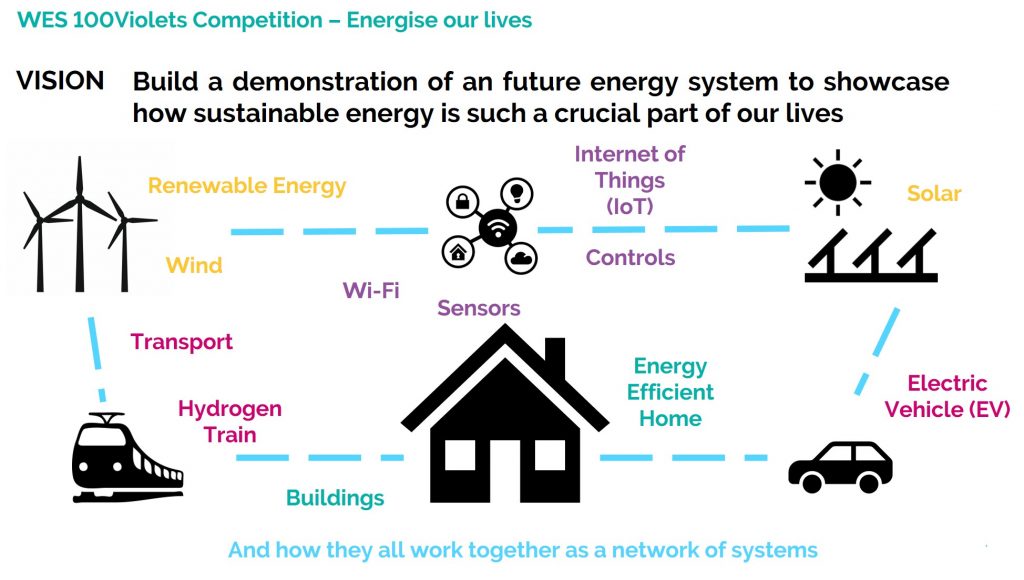
About the Project Team: Dr Jannetta Steyn
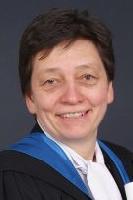
Jannetta is a Research Software Engineer at the Digital Institute, Newcastle University. As an experienced researcher and software engineer she has a background in data analysis, provenance and middleware programming. Jannetta does a large amount of outreach work, primarily in STEM, running a range of coding clubs and electronics clubs.
Contact:- Jannetta.Steyn@newcastle.ac.uk
http://brainwaves.jannetta.com/
About the Project Team: Laura Brown
Laura is the Centre Manager, EPSRC National Centre for Energy Systems Integration and Energy Research Programme Manager, Newcastle University. Her research tackles the challenges of integration of state-of-the-art thinking and technology into legacy and future energy systems. Laura sits on the Tees and Tyne Regional Cluster Committee of the Women’s Engineering Society and is the group leader of the SDG7 subgroup of the WES Climate Emergency Group.
Contact:- laura.brown11@newcastle.ac.uk
Our first outing
By way of practice for the WES 100Violets Exhibition planned for April 2020, we were lucky enough to be offered a chance to “trial” the exhibit at the opening event of the Gateshead Library Makerspace. We were delighted that the training we have been given by WES had come in very useful, particularly the risk assessment guidance. This meant we had planned carefully the storage requirements, labeling and cable routes for the equipment for our exhibit.
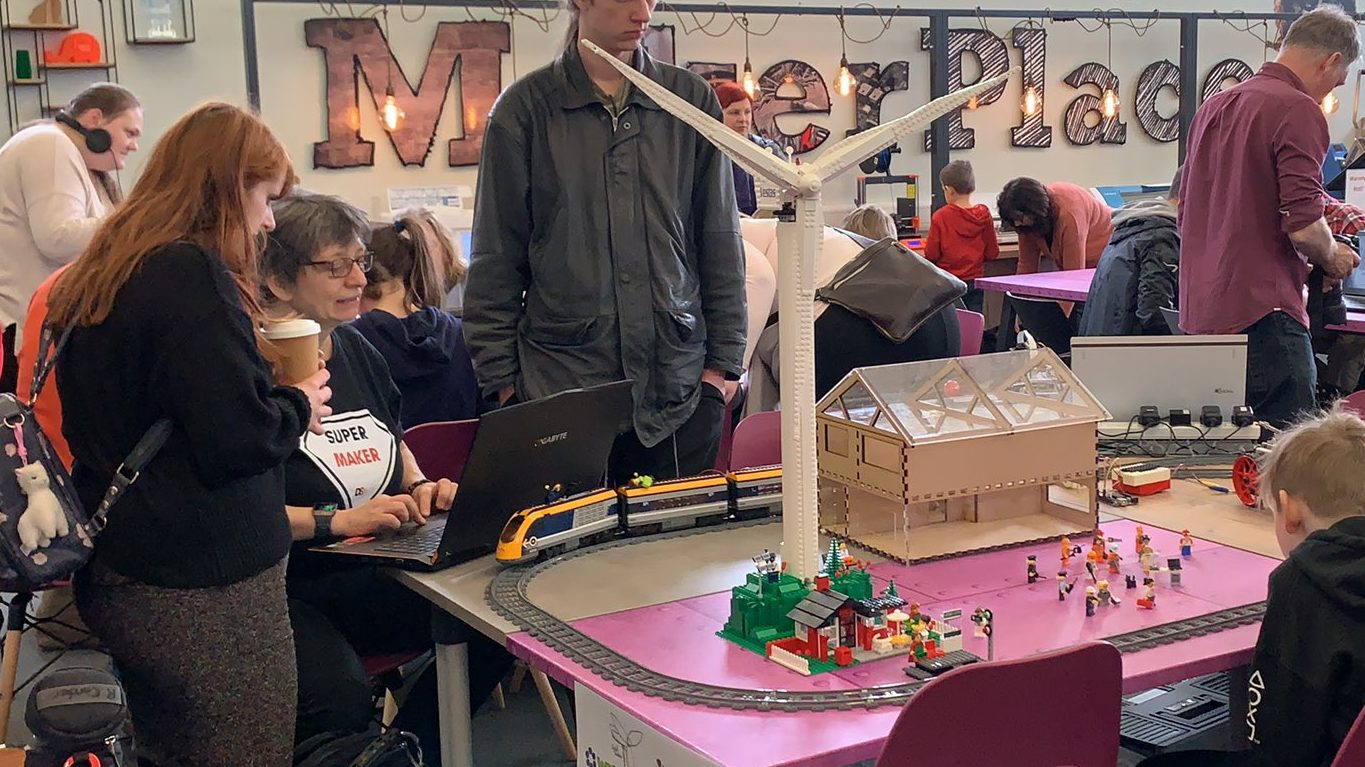
The event went well but underlined what we suspected:- KIDS LOVE LEGO. It proved to be a popular exhibit. And, while it might have been the draw of the remote control car (with its own garage), the Bluetooth controlled train or the eye-catching rotating wind turbine, all of the young people we spoke with left knowing just a little bit more than they did about renewable energy and role of women in engineering and computing.
So how do these technologies work in real life?
Part of the purpose of the exhibit was to provide educational information on the energy system. So we had been working on a number of learning resources that we thought might help engage the visitors to the exhibition. We had planned to have ‘make your own’ wind mill; colouring sheets; spot the energy competitions and possibly a 3D printing demo session.
It was all looking good but then as the date for the main event drew near, the impact of the pandemic was starting to reach home. The organisers took the difficult but inevitable decision to postpone the exhibition.
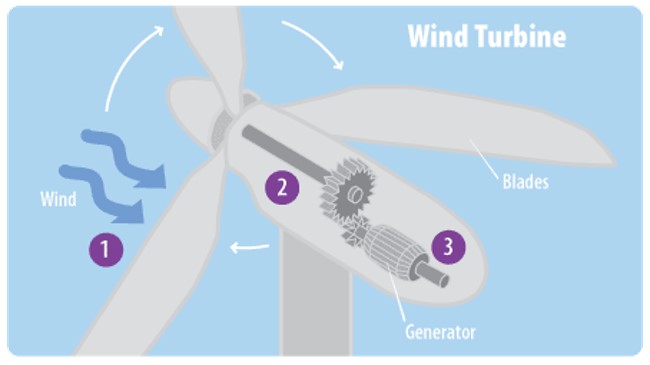
- As the wind blows over the blades of a wind turbine, it causes the blades to lift and rotate.
- The rotating blades turn a shaft that is connected to a generator.
- The generator creates electricity as it turns.
Some great STEM resources out there to explain energy
As part of our research we found some very useful STEM resources that we would highly recommend for anyone looking to understand more about their own energy system.
- BBC Bitesize – Humans and the Environment https://www.bbc.co.uk/bitesize/topics/zp22pv4
- NASA’s Climate Kids https://climatekids.nasa.gov/menu/energy/
- CALTECHs Energy STEM resources https://www.jpl.nasa.gov/edu/learn/tag/search/Energy
So what now
While cancelling the event was most definitely the right thing to do, all the groups from the WES competition were disappointed. Lockdown meant our team couldn’t even get onto campus to check our equipment and work further on the exhibit. Everything paused.
When the North East of England partially removed the lockdown in the summer, Jannetta collected all the components of the exhibit to have at home. So after the most recent national lockdown and encouraged by Dr Jo Douglas-Harris, the WES Tees and Tyne Cluster Chair, we looked for alternative ways to ‘tell the story’ of the project and share the vision. The new aim: let’s try to exhibit virtually. A new challenge for us both.
So for the last month of so, in our rare moments of spare time and in our evenings, we have put together some materials and collated the reflections and learning from the project in two blogs (this one and that one (https://blogs.ncl.ac.uk/cesi/2021/01/29/wes-100violets-part1/)). And we are going to trial exhibiting virtually via a livestream on CESI’s YouTube Channel.
The EPSRC National Centre for Energy System Integration (CESI) YouTube Channel
Event Details
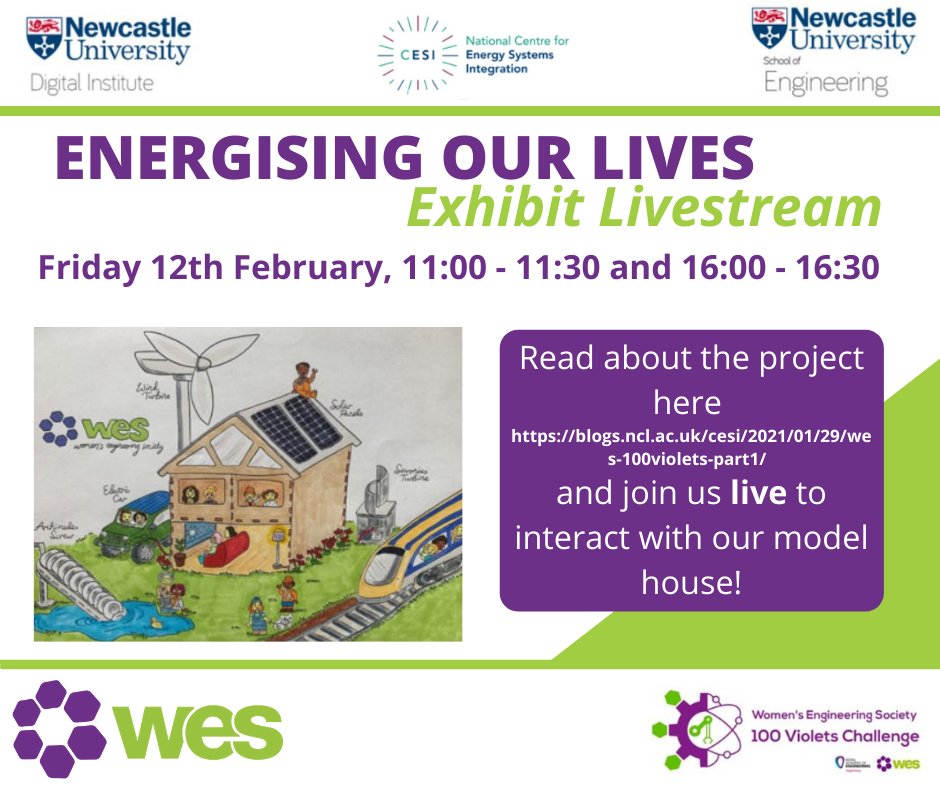
And we’ve got an accompanying YouTube video too.